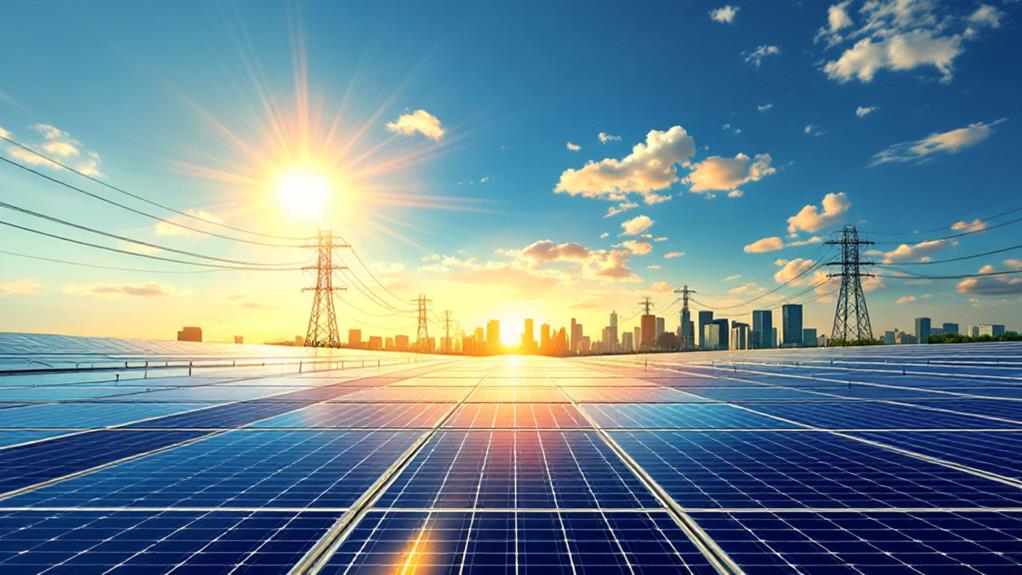How to Power Remote Wedding Venues: Explore Alternative Energy Solutions
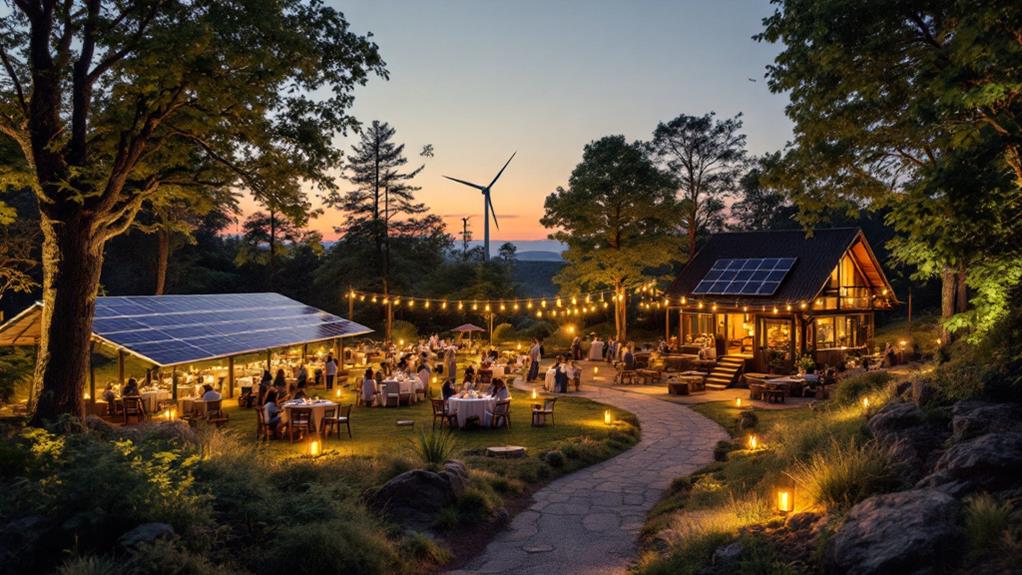
Powering remote wedding venues is easy with alternative energy solutions. Start by considering solar energy systems, which are reliable and eco-friendly. Wind power is another great option, especially in coastal or open field areas where small turbines can provide sustainable energy. Hydroelectric options and biofuel generators offer clean power from natural resources. For heating and cooling, geothermal systems are efficient and sustainable. Portable battery packs guarantee energy reliability, and hybrid systems combine multiple sources for consistency. With these eco-friendly approaches, you'll not only reduce the carbon footprint but also impress guests with innovation. Uncover the details on each solution next.
Solar Energy Systems
Regarding powering remote wedding venues, solar energy systems are a game-changer. You might be wondering how to keep the lights on and the music playing in a location far from the grid, and solar is the perfect solution. By investing in solar panel installation, you can harness the sun's power to create a sustainable and reliable energy source. This technology allows you to transform abundant sunlight into electricity, ensuring your venue operates smoothly without interruption.
Once your solar panel installation is complete, you'll need to think about solar energy storage. Efficient storage systems capture excess energy generated during sunny days, so you have power even when the sun isn't shining. This means you can host events during evenings or cloudy days without worrying about electricity shortages. Solar energy systems are not only environmentally friendly but also cost-effective in the long run, saving you money on fuel and reducing your carbon footprint.
Wind Power Solutions
While solar energy systems provide a robust solution for many remote wedding venues, wind power also offers a compelling alternative or complement. Harnessing the power of the wind can be an efficient way to guarantee your venue remains energy-sufficient in remote locations. Here's what you need to take into account:
- Location Suitability: You'll want to assess if the venue is in a wind-rich area. Coastal regions or open fields are ideal candidates for wind energy.
- Turbine Installation: Small-scale wind turbines can be installed on-site. These turbines can blend into the landscape and provide a sustainable power source. However, keep in mind that regular wind turbine maintenance is essential to maintain efficiency and longevity.
- Offshore Possibilities: If your venue is near the coast, you might even investigate offshore wind farms. These farms harness stronger winds over the sea and can supply substantial energy, though they require more complex logistical and legal considerations.
- Energy Storage Solutions: Complement your wind power system with batteries to store energy. This guarantees a steady power supply, even when the wind isn't blowing.
Incorporating wind power solutions not only makes your venue eco-friendly but can also greatly reduce energy costs over time.
Hydroelectric Options

Shifting focus to hydroelectric options, you'll find that these systems can be a fantastic improvement to remote wedding venues, especially those near flowing water sources. By harnessing the natural flow of rivers or streams, you can generate clean energy, reducing reliance on traditional power grids. The key to implementing hydroelectric power lies in strategic water sourcing and efficient turbine installation.
First, you'll need to assess the available water sources. A consistent and reliable flow is essential for generating enough energy to power the venue. Once you've identified a suitable location, the next step involves turbine installation. This process requires careful planning to guarantee minimal impact on the environment while maximizing energy output. There are different types of turbines to evaluate, such as Kaplan or Pelton turbines, each suited to varying flow conditions.
After installing the turbines, you'll need to maintain them regularly to guarantee long-term efficiency. Keep in mind that local regulations may require permits for water usage or environmental impact assessments. By weighing hydroelectric options, you can provide a sustainable and memorable experience for couples celebrating their big day in a picturesque, eco-friendly setting.
Biofuel Generators
Sustainability takes center stage when considering biofuel generators for remote wedding venues. You might be wondering why biofuel is a smart choice. Well, it's not just about reducing your carbon footprint; it's also about reliability and versatility. Biofuel generators use organic materials, meaning you've got renewable options. Here's how you can benefit:
- Various Biofuel Types: You can choose from options like biodiesel, ethanol, and biogas. Each has its pros and cons, so consider what's readily available in your area and matches your energy needs.
- Easy Generator Maintenance: Biofuel generators are generally easier to maintain than traditional diesel ones. Regular checks on fuel levels and filters can keep your generator running smoothly and efficiently.
- Reduced Emissions: By opting for biofuel, you'll greatly cut down on the emissions compared to fossil fuels. This not only supports environmental goals but also guarantees cleaner air for your guests.
- Dependable Energy Source: Biofuel generators offer a trustworthy power solution, especially crucial for those remote venues where the main grid isn't an option.
With these benefits, biofuel generators stand out as a green, efficient choice for powering your remote wedding venue.
Portable Battery Packs
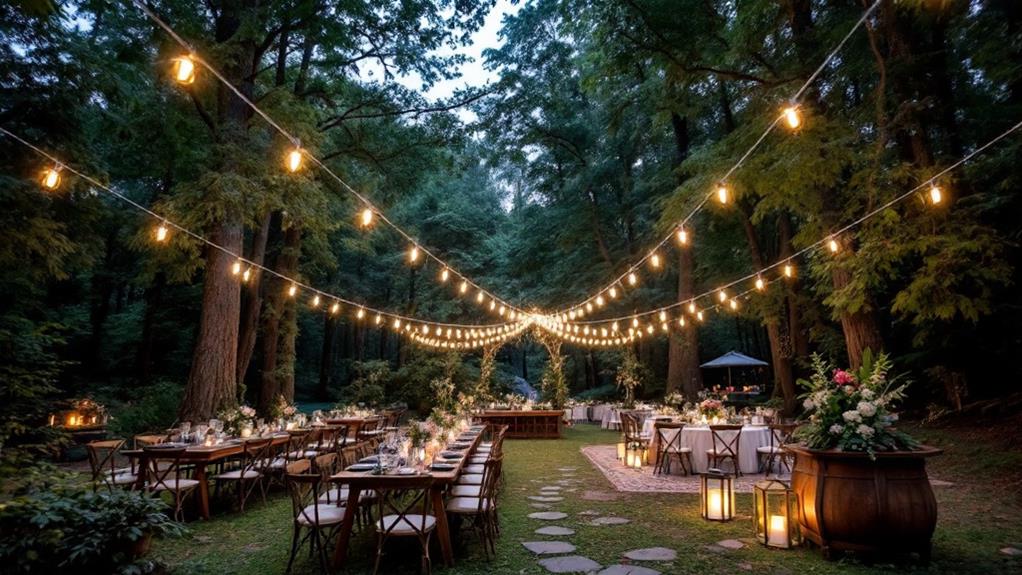
In regards to powering remote wedding venues, portable battery packs offer a convenient and eco-friendly solution. They're perfect for those picturesque locations that lack a reliable electricity supply. These battery packs provide clean energy without the noise and emissions associated with traditional generators. They're lightweight and easy to transport, making them ideal for settings where mobility is key.
When selecting a portable battery pack, consider the battery capacity. You'll want a unit that can handle your venue's energy demands, regardless of whether it's powering lights, sound systems, or catering equipment. Calculate the total wattage required and choose a battery pack that can deliver that power efficiently. It's essential to select a model with enough capacity to last through the entire event without frequent recharges.
Charging options are another significant factor. Many portable battery packs can be charged using standard wall outlets, solar panels, or even car chargers. This versatility guarantees you can recharge your pack wherever you are, depending on what's available. Before the big day, test your chosen charging method to confirm everything works smoothly. With the right portable battery pack, you can create a magical wedding experience, no matter how remote the location.
Hybrid Energy Solutions
Hybrid energy solutions offer a versatile approach to powering remote wedding venues, combining the benefits of renewable energy sources with traditional systems for a reliable power supply. By blending solar panels or wind turbines with conventional generators, you guarantee that your venue remains powered, no matter the weather. These systems allow for seamless renewable integration, making use of energy storage to capture and store excess power for later use. This way, you can enjoy your special day without interruptions or unexpected outages.
When planning your hybrid energy setup, consider the following key components:
- Solar Panels: Harness the power of the sun, cutting down on fuel costs and reducing your carbon footprint.
- Wind Turbines: Perfect for venues located in windy areas, these can complement solar power by generating electricity even when the sun isn't shining.
- Energy Storage: Batteries store surplus energy, guaranteeing a consistent power supply and smoothing out any fluctuations in renewable energy sources.
- Backup Generators: A traditional backup guarantees energy availability during peak demands or when renewable sources are insufficient.
Geothermal Energy Use
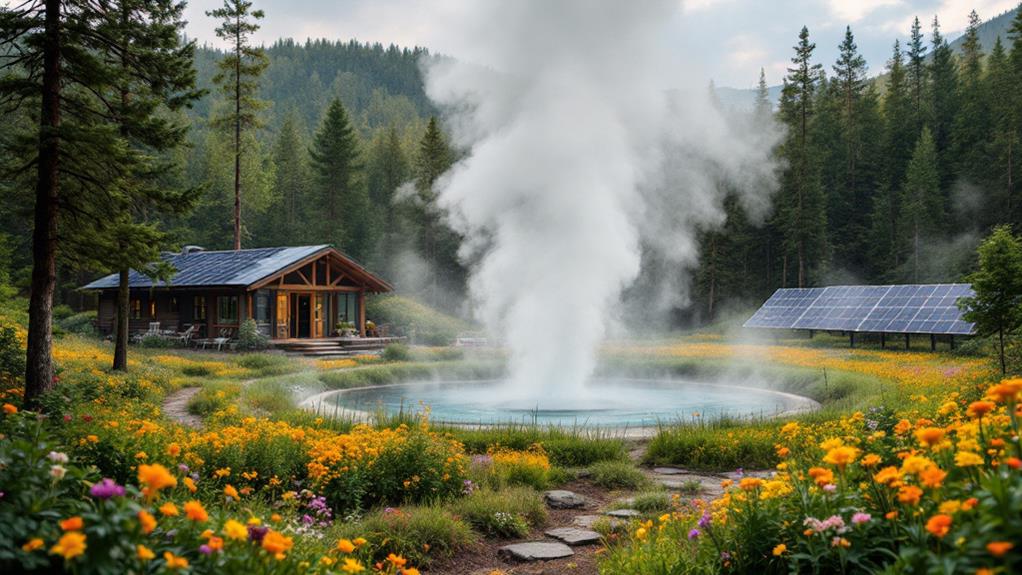
When considering energy options for remote wedding venues, geothermal energy stands out as an efficient and sustainable choice. With geothermal heating and cooling, you can harness the earth's stable temperatures to regulate your venue's climate. This system greatly reduces the need for traditional HVAC units, ensuring your venue stays comfortable regardless of the weather outside.
To implement geothermal energy, you'll need to install a geothermal heat pump. This device transfers heat from the ground into your venue during cold months, providing efficient geothermal heating. In warmer months, the process reverses, and the heat pump extracts heat from the building, delivering geothermal cooling. This cycle not only maintains a pleasant indoor environment but also lowers energy bills, which can be a considerable advantage for venues operating in off-grid locations.
You'll find that geothermal systems have a higher initial investment than conventional systems. However, the long-term savings and reduced environmental impact often justify the cost. Plus, since these systems have fewer moving parts, maintenance is minimal. By choosing geothermal energy, you're opting for a reliable, eco-friendly solution that improves your venue's appeal to environmentally conscious couples.
Energy Efficiency Practices
Many remote wedding venues can considerably benefit from adopting energy efficiency practices. By doing so, you not only reduce energy consumption but also create a more sustainable and eco-friendly environment for your events. Start by conducting energy audits to identify areas where energy is wasted. These audits help pinpoint inefficient lighting, poorly insulated structures, or outdated appliances. Once you've gathered this information, you can take actionable steps to improve energy use.
Here's a simple guide to get started:
- Upgrade Lighting: Switch to LED bulbs, which consume less power and last longer than traditional lighting options.
- Improve Insulation: Guarantee that your venue's walls, ceilings, and floors are adequately insulated to maintain temperatures without over-relying on heating or cooling systems.
- Install Energy-efficient Appliances: Opt for appliances with Energy Star ratings to cut down on electricity use in kitchens and other facilities.
- Implement Smart Technology: Use smart thermostats and lighting controls to optimize energy usage based on real-time needs.
Cost Considerations
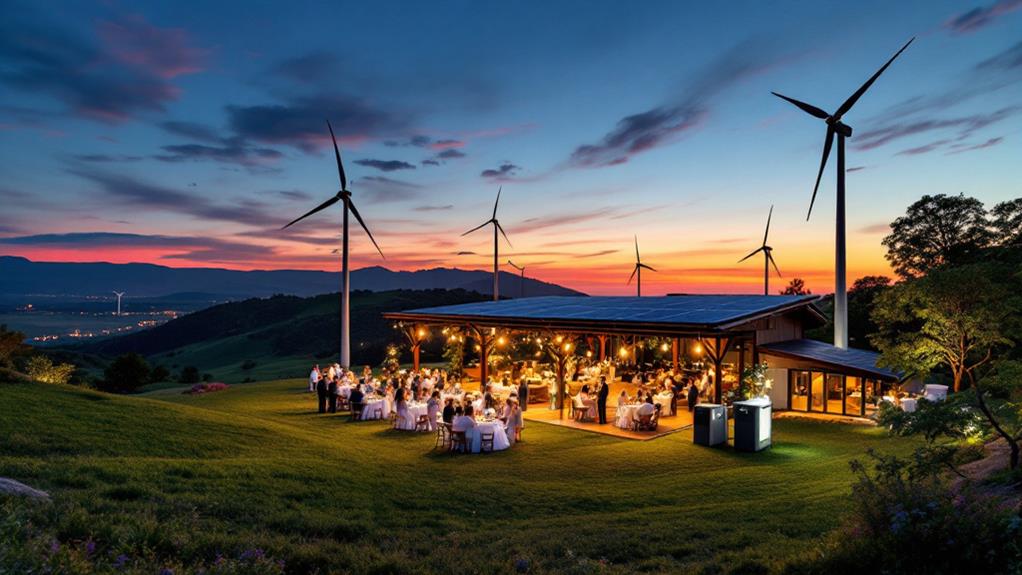
How can you balance the budget while enhancing the sustainability of remote wedding venues? Begin with a thorough budget analysis. This means evaluating initial costs versus potential long-term savings. Investing in alternative energy solutions may seem pricey upfront, but they often pay for themselves over time. Solar panels, for instance, require an initial investment, but they can greatly reduce your electricity bills. Consider leasing options or government incentives to ease the financial burden.
Next, investigate wind or hydroelectric power if the location allows. While these might seem niche, in certain environments, they're cost-effective. Conduct a detailed budget analysis to understand installation and maintenance costs compared to conventional energy sources.
Don't forget about energy storage solutions like batteries. They guarantee continuous power supply, even when natural energy sources aren't active, and can also contribute to long-term savings. Factor these into your budget, keeping in mind that while initial costs may be high, the reduction in reliance on traditional power grids will save money over time.
Environmental Benefits
Balancing the budget while enhancing sustainability not only makes financial sense but also brings considerable environmental benefits. When you opt for alternative energy solutions at remote wedding venues, you're directly contributing to a healthier planet. Here's how:
- Reduced Carbon Footprint: By using solar panels or wind turbines, you markedly lower the venue's carbon footprint. These sustainable practices cut down on greenhouse gas emissions, making your event more eco-friendly.
- Preservation of Natural Landscapes: Remote venues often boast stunning natural settings. Sustainable energy solutions help preserve these landscapes by minimizing the need for invasive infrastructure, keeping the environment as pristine as possible.
- Resource Conservation: Alternative energy solutions often rely on renewable resources, like wind or sunlight. This reduces dependency on finite fossil fuels, conserving essential natural resources for future generations.
- Promotion of Eco-Consciousness: By choosing sustainable practices, you set a powerful example for your guests, promoting environmental awareness and encouraging others to reflect on eco-friendly choices in their events and daily lives.
